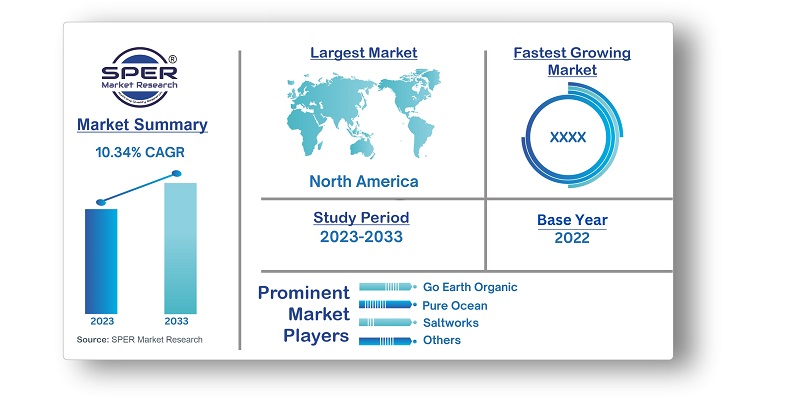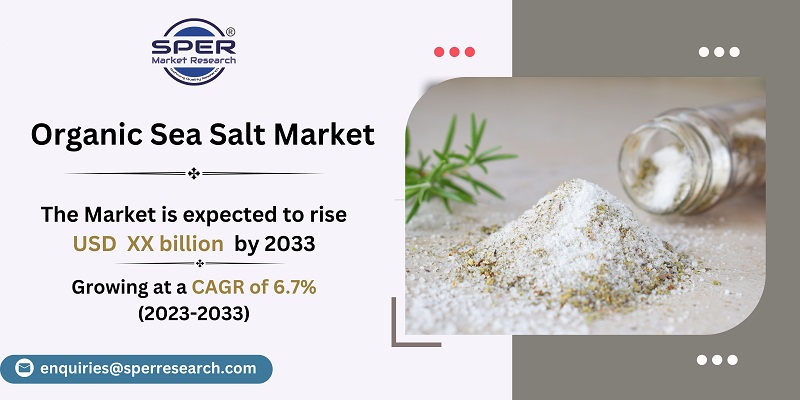
Organic Sea Salt Market Growth, Size, Trends, Revenue, Share, Competition and Future Outlook
Organic Sea Salt Market Size- By Type, By Application- Regional Outlook, Competitive Strategies and Segment Forecast to 2033
| Published: Dec-2023 | Report ID: FOOD23104 | Pages: 1 - 220 | Formats*: |
| Category : Food & Beverages | |||


| Report Metric | Details |
| Market size available for years | 2019-2033 |
| Base year considered | 2022 |
| Forecast period | 2023-2033 |
| Segments covered | By Type, By Application |
| Regions covered | North America, Asia-Pacific, Latin America, Middle East & Africa and Europe |
| Companies Covered | Go Earth Organic, Pure Ocean, Saltworks, San Francisco Salt Co., TATA Salt, Others |
- Key Target Audience
- Bloggers, nutritionists, and wellness influencers who can promote the benefits of organic sea salt
- Consumers with Dietary Restrictions
- Gourmet and Culinary Enthusiasts
- Health-Conscious Consumers
- Organic and Natural Food Enthusiasts
- People Seeking Flavor Complexity
- Restaurant and Hospitality Industry
- Others
| By type: |
|
| By Application: |
|
| By Region: |
|
- Global Organic Sea Salt Market Size (FY’2023-FY’2033)
- Overview of Global Organic Sea Salt Market
- Segmentation of Global Organic Sea Salt Market By Type (Food Grade, Industry Grade, Other)
- Segmentation of Global Organic Sea Salt Market By Application (Food, Healthcare, Industrial, Personal Care)
- Statistical Snap of Global Organic Sea Salt Market
- Expansion Analysis of Global Organic Sea Salt Market
- Problems and Obstacles in Global Organic Sea Salt Market
- Competitive Landscape in the Global Organic Sea Salt Market
- Impact of COVID-19 and Demonetization on Global Organic Sea Salt Market
- Details on Current Investment in Global Organic Sea Salt Market
- Competitive Analysis of Global Organic Sea Salt Market
- Prominent Players in the Global Organic Sea Salt Market
- SWOT Analysis of Global Organic Sea Salt Market
- Global Organic Sea Salt Market Future Outlook and Projections (FY’2023-FY’2033)
- Recommendations from Analyst
1.1. Scope of the report1.2. Market segment analysis
2.1. Research data source
2.1.1. Secondary Data2.1.2. Primary Data2.1.3. SPER’s internal database2.1.4. Premium insight from KOL’s
2.2. Market size estimation
2.2.1. Top-down and Bottom-up approach
2.3. Data triangulation
4.1. Driver, Restraint, Opportunity and Challenges analysis
4.1.1. Drivers4.1.2. Restraints4.1.3. Opportunities4.1.4. Challenges
4.2. COVID-19 Impacts of the Global Organic Sea Salt Market
5.1. SWOT Analysis
5.1.1. Strengths5.1.2. Weaknesses5.1.3. Opportunities5.1.4. Threats
5.2. PESTEL Analysis
5.2.1. Political Landscape5.2.2. Economic Landscape5.2.3. Social Landscape5.2.4. Technological Landscape5.2.5. Environmental Landscape5.2.6. Legal Landscape
5.3. PORTER’s Five Forces
5.3.1. Bargaining power of suppliers5.3.2. Bargaining power of buyers5.3.3. Threat of Substitute5.3.4. Threat of new entrant5.3.5. Competitive rivalry
5.4. Heat Map Analysis
6.1. Global Organic Sea Salt Market Manufacturing Base Distribution, Sales Area, Product Type6.2. Mergers & Acquisitions, Partnerships, Product Launch, and Collaboration in Global Organic Sea Salt Market
7.1. Global Organic Sea Salt Market Value Share and Forecast, By Type, 2023-20337.2. Food Grade7.3. Industry Grade7.4. Other
8.1. Global Organic Sea Salt Market Value Share and Forecast, By Application, 2023-20338.2. Food8.3. Healthcare8.4. Industrial8.5. Personal Care
9.1. Global Organic Sea Salt Market Size and Market Share
10.1. Global Organic Sea Salt Market Size and Market Share By Type (2019-2026)10.2. Global Organic Sea Salt Market Size and Market Share By Type (2027-2033)
11.1. Global Organic Sea Salt Market Size and Market Share By Application (2019-2026)11.2. Global Organic Sea Salt Market Size and Market Share By Application (2027-2033)
12.1. Global Organic Sea Salt Market Size and Market Share By Region (2019-2026)12.2. Global Organic Sea Salt Market Size and Market Share By Region (2027-2033)
12.3. Asia-Pacific
12.3.1. Australia12.3.2. China12.3.3. India12.3.4. Japan12.3.5. South Korea12.3.6. Rest of Asia-Pacific
12.4. Europe
12.4.1. France12.4.2. Germany12.4.3. Italy12.4.4. Spain12.4.5. United Kingdom12.4.6. Rest of Europe
12.5. Middle East and Africa
12.5.1. Kingdom of Saudi Arabia12.5.2. United Arab Emirates12.5.3. Rest of Middle East & Africa
12.6. North America
12.6.1. Canada12.6.2. Mexico12.6.3. United States
12.7. Latin America
12.7.1. Argentina12.7.2. Brazil12.7.3. Rest of Latin America
13.1. Go Earth Organic
13.1.1. Company details13.1.2. Financial outlook13.1.3. Product summary13.1.4. Recent developments
13.2. Pure Ocean
13.2.1. Company details13.2.2. Financial outlook13.2.3. Product summary13.2.4. Recent developments
13.3. Saltworks
13.3.1. Company details13.3.2. Financial outlook13.3.3. Product summary13.3.4. Recent developments
13.4. San Francisco Salt Co.
13.4.1. Company details13.4.2. Financial outlook13.4.3. Product summary13.4.4. Recent developments
13.5. TATA Salt
13.5.1. Company details13.5.2. Financial outlook13.5.3. Product summary13.5.4. Recent developments
13.6. Others
SPER Market Research’s methodology uses great emphasis on primary research to ensure that the market intelligence insights are up to date, reliable and accurate. Primary interviews are done with players involved in each phase of a supply chain to analyze the market forecasting. The secondary research method is used to help you fully understand how the future markets and the spending patterns look likes.
The report is based on in-depth qualitative and quantitative analysis of the Product Market. The quantitative analysis involves the application of various projection and sampling techniques. The qualitative analysis involves primary interviews, surveys, and vendor briefings. The data gathered as a result of these processes are validated through experts opinion. Our research methodology entails an ideal mixture of primary and secondary initiatives.



Frequently Asked Questions About This Report
PLACE AN ORDER
Year End Discount
Sample Report
Pre-Purchase Inquiry
NEED CUSTOMIZATION?
Request CustomizationCALL OR EMAIL US
100% Secure Payment






Related Reports
Our Global Clients
Our data-driven insights have influenced the strategy of 200+ reputed companies across the globe.




















